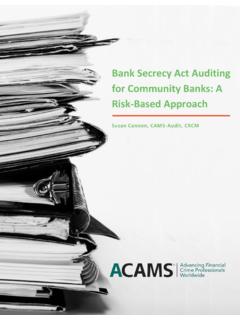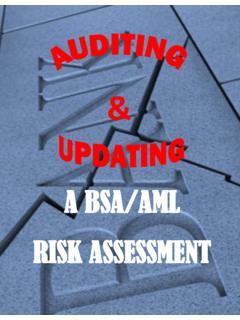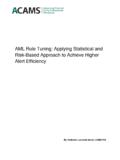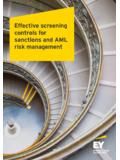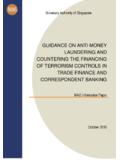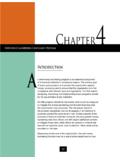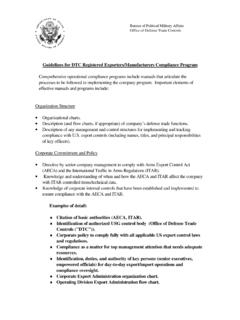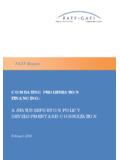Transcription of OFAC and the Role of the Three Lines of Defense
1 OFAC and the Role of the Three Lines of Defense History of OFAC. Throughout history, economic sanctions have been closely linked with war and were intended to weaken the enemy. After World War I, President Woodrow Wilson called for an alternative to armed conflict and economic sanctions were seriously considered. Both the League of Nations and the United Nations used sanctions as a tool of enforcement. The highest profile sanctions were imposed on Iraq following the Gulf War in 1991. In addition to the UN, the continues to implement economic sanctions . Since 1990, sanctions have been targeted towards political regimes, drug traffickers and terrorists. (Kimberly Ann Elliot 2008). OFAC Authority and Oversight The Office of Foreign Assets Control (OFAC) is a division of the Treasury that has responsibility for administering and enforcing economic and trade sanctions . OFAC operates under Presidential wartime and national emergency powers, as well as authority granted by legislation that allows OFAC to impose controls over transactions and to freeze assets under jurisdictions.
2 The Secretary of the Treasury has delegated the responsibility to develop, enforce and oversee the various sanctions programs currently in place. (Federal Financial Institutions Examination Council 2010). OFAC Exterritorial Impact Unlike Bank Secrecy Act legislation, OFAC-related regulations have applicability outside borders. All persons, to include permanent residents, individuals located in the and banks, their domestic branches, agencies, international banking facilities, foreign branches and overseas offices and subsidiaries are required to comply with OFAC regulations when transacting in dollars. This includes branches for foreign financial institutions, as well as persons working at foreign corporations outside of the at the time the transactions are processed. (Slear 2006) At a high-level, OFAC requires the blocking of accounts and property of specified countries, entities and individuals. It also prohibits or requires the rejecting of unlicensed trade and financial transactions with sanctioned countries, entities and individuals.
3 (Federal Financial Institutions Examination Council 2010). OFAC Sanction Programs As previously noted, OFAC administers a number of different sanctions programs against various countries and political regimes, all with varying degrees of severity. Currently, there are sanctions programs involving the following countries: Balkans, Belarus, Burma, Ivory Coast, Cuba, Democratic Republic of Congo, Iran, Iraq, Former Regime of Charles Taylor, Libya, North Korea, Somalia, Sudan, Syria, Yemen and Zimbabwe. In addition to the country-specific sanctions , OFAC has also implemented sanctions relating to counter narcotics trafficking, Tara Johnston 1. OFAC and the Role of the Three Lines of Defense counter terrorism, non-proliferation of weapons of mass destruction, rough diamond trade transnational criminal organizations as well as Magnisty sanctions . Individuals associated with the various sanctions programs are classified as a Specially Designated Nationals (SDNs).
4 (US. Department of Treasury 2012) Although there have been changes to the sanctions programs over the years, the illustration below provides a flavor for the scope and breadth of the various countries with sanctions programs. (Fritsch 2010). Recent Enforcement Actions for Non-Compliance with sanctions Since 2010, there has been an increase in the number of enforcement actions where major international financial institutions have agreed to forfeit billions to the United States Government in connection with apparent violations of US sanctions programs. A similarity in Three of the major cases is that employees were aware of the activities that led to the violations. HSBC Holdings plc In December 2012, HSBC Holdings plc settled potential liability for apparent violations of multiple sanctions programs. HSBC paid a sum of $375,000,000 to OFAC for apparent violations of sanctions relating to Cuba, Burma, Sudan, Libya and Iran. From March 2004 to June 2010, HSBC processed 2,335 wire transfers for approximately $430,078,225 involving various sanctioned entities.
5 HSBC affiliates in Europe, Asia and the Middle East processed transactions through financial institutions that involved locations, entities or individuals subject to Tara Johnston 2. OFAC and the Role of the Three Lines of Defense sanctions . The London head office and Dubai branch were cited with manipulating or stripping data from SWIFT messages prior to sending the payment to the for processing. The Department of Treasury found that the apparent violations were egregious and that HSBC staff failed to exercise caution in avoiding these transactions and that staff, including senior management were aware of the transactions that were being processed which led to the apparent violations. (US Department of Treasury 2012). Standard Chartered A day before the announcement of the enforcement actions against HSBC, Standard Chartered Bank agreed to a settlement with OFAC for $132 million for the apparent violations of sanctions relating to Iran, Burma, Libya and Sudan.
6 It was alleged that from 2001 to 2007 that the London and Dubai offices of Standard Chartered Bank omitted or removed references to sanctioned locations or entities from payment instructions prior to submitting the payment requests to financial institutions for processing. (US Department of Treasury 2012) (US. Department of Treasury 2012). Royal Bank of Scotland In 2010, Royal Bank of Scotland (RBS), formerly known as ABN Amro Bank agreed to forfeit $500 million to the in connection with claims made that it conspired to defraud the , violated the International Emergency Economic Powers Act (IEEPA), the Trading with the Enemy Act (TWA), as well as violation of the Bank Secrecy Act (BSA). It was alleged that ABN. Amro removed critical information from wire transfers prior to submitting the instructions to financial institutions. During the course of 10 years, payments worth hundreds of millions were processed on behalf of sanctioned countries and entities.
7 According to court documents, certain offices, branches, affiliates and subsidiaries effectively stripped any information relating to a sanctioned interest from payment messages. They also implemented procedures and a separate queue to repair payments which contain a reference to a sanctioned entity. Procedure manuals were created and included information on how to make changes to these instructions, so that the payments would bypass payment filters maintained by banks. (US. Department of Justice 2010). Who Owns the Risk? Often times there is confusion among management and compliance as to who owns the risk relating to sanctions , to include ongoing monitoring and reporting. This can be caused by a lack of clearly defined roles and responsibilities across the Three Lines of Defense . The challenge is to find the right balance between the various control functions to ensure that there are no gaps in coverage, while at the same time avoiding duplications in coverage and oversight.
8 Due to the Tara Johnston 3. OFAC and the Role of the Three Lines of Defense nature, size and complexity of various financial institutions, each organization may have a slightly different way in which the work of the Three Lines of Defense is implemented and coordinated. Noted below is a summary of the underlying role of each group as part of the compliance risk management process. (Institute of Internal Auditors 2013). FIRST line OF Defense SECOND line OF Defense THIRD line OF Defense . Risk Owners/Managers Risk Control and Compliance Risk Assurance operating management limited independence internal audit reports primarily to greater independence management reports to governing body Source: IIA Position Paper on the Three Lines of Defense in Effective Risk Management and Control First line of Defense The business unit responsible for onboarding customers is the first line of Defense responsible for embedding a strong risk and control environment into the daily business as usual activities.
9 In relation to sanctions controls, as the first line of Defense , it is the responsibility of the business to understand the customer's source of funds and wealth, expected account activity, ownership structure, as well as the associated and/or controlling parties. In the case of affiliates, it is imperative for the financial institution to know their customer's customer. If sufficient information is not obtained at the time of account opening, there is an increased risk that the customer screening against the OFAC list at the time of account opening is ineffective and increases the potential for on-boarding a sanctioned party or interest. If a foreign affiliate or correspondent has poor KYC and onboarding controls, the exposure and risk of processing a transaction on behalf of a sanctioned interest increases significantly. Areas to be reviewed and tested by Internal Audit: How robust is the account opening procedure and process for the unit under review?
10 Are accounts opened with missing information and documentation? Is there is a process in place to identify the ultimate beneficial owners, controlling and interested parties? How well do affiliates or foreign correspondents collect Know Your Customer (KYC). information? Tara Johnston 4. OFAC and the Role of the Three Lines of Defense Second line of Defense Compliance as the second line of Defense is responsible for implementing and maintaining a robust OFAC compliance program to include risk assessments, written policies and procedures, interdiction software, creation of customized training, acting as a point of escalation and reporting the blocking of funds to OFAC at the time of blocking and on an annual basis going forward. A compliance testing function should also exist as part of the second line of Defense , which will oversee the first line and opine on their ability to comply with OFAC requirements. OFAC/ sanctions Compliance Program Risk Assessment When starting the scoping and planning for an examination of the OFAC function within an organization, the first document to obtain and review is the OFAC risk assessment.
